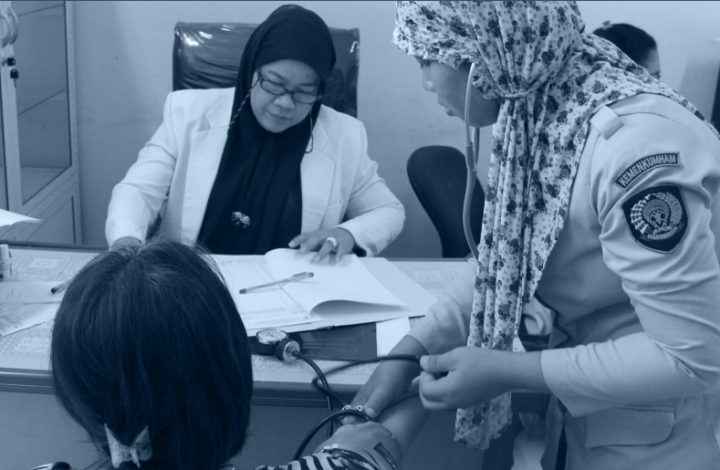Criminal justice systems routinely overlook the specific needs of women and girls in prisons. Although there are major differences in the policies and practices adopted by countries around the world, many still fail to meet women’s basic needs and are far from complying with accepted international recommendations, human rights principles and social justice (WHO and UNODC 2009).
The purpose of the mapping exercise is to learn more about the situation of women’s health in Indonesian prisons. Its aim is to review current policies and practices, and to generate strategic information on the needs and gaps relating to women’s health in prisons.
A desk review of international and national laws, policies and recommendations was conducted, as well as a review of literature on women’s health in prison in Indonesia. Data was collected using the WHO/UNODC Women’s health in prison – action guidance and checklists, specifically designed for stakeholders with responsibility in prisons to (self-) assess the current situation and identify areas for improvement. Checklists were filled in by Directorate of Corrections representatives (13), heads of prisons (15), and prison health staffs (15).
While the Indonesian law provides prisoners with basic rights, including access to education, health services, decent nutrition, and the right to maintain contact with family members, current legislation does not specifically address the human rights and health of women and their children in prisons.
Prison management policies and practices related to the treatment of women and their health vary considerably across Indonesian prisons. The same is true for awareness and attitudes among prison managers and health staff.
A lack of gender sensitive legislation regarding women in prisons on a national level, limited resources and awareness, as well as overcrowding makes it difficult for correctional facilities and prison health staff to take into account the specific needs of women in prisons and put into practice related UN standards and rules for the treatment of women prisoners.
Indonesia is one of 193 countries, which has voted for the United Nations Rules for the Treatment of Women Prisoners and Non-Custodial Measures for Women Offenders (Bangkok Rules) in December 2010, therefore acknowledging that women in the criminal justice system do have gender-specific characteristics and needs, and agreed both to respect and meet them.
In 2016 two representatives of the Directorate General of Corrections (DGC) took part in the “Bangkok Rules Training” conducted by the Thailand Institute of Justice (TIJ) in Thailand. As a follow-up to the training, in 2017, the DGC reached out to UNODC to get support with the implementation of the Bangkok Rules in Indonesia, which was promptly responded with this mapping exercise. By attending the Bangkok Rules Training in Thailand and conducting this mapping exercise, Indonesia has taken two important steps towards improving the rights of women in prison.
This mapping exercise constitutes the first review of current policies and practices regarding women’s health and health care in Indonesian prisons using the WHO/UNODC checklists. While limited in terms of methodology and scope, much needed information on needs and gaps, 8 but also good practices and initiatives, can be generated and used to inform future planning and actions by those who can make a difference.
There is a clear need for more gender sensitive penal policies and prison rules to ensure women’s health needs are properly addressed. Moreover, joint commitment by all key actors who are involved in the treatment of women prisoners is needed to push for a change in awareness, attitude and practices to put international standards into practice and improve health outcomes for women prisoners, their children and the wider community.
Read full report: Women’s Rights and Health in Indonesia’s Prisons: A Review of Current Practices
Read the Practical Handbook: The Implementation of HIV-AIDS Control for Prisoners
